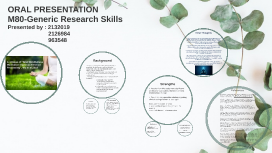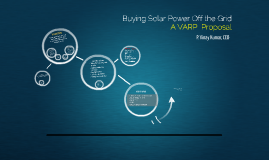Generic Presentation
Transcript: Final Thoughts ORAL PRESENTATION M80-Generic Research Skills Presented by : 2132019 2126984 963548 - Authors concluded that newly developed BMM programme JW2016 BMM (15 min a day for 7 consecutive days) was able to improve emotion processing, including emotion intensity, emotional memory, and emotional attention bias, without any negative effect on the emotions of healthy practitioners - They have identified some limitations to the study such as; failed to include a blank control manipulation, single-blind design, short duration of study, small sample size. - Researchers are argued possible positive benefits of the intervention consistently throughout the article and their stance in relation to the topic is towards this argument - No clear evidence of authors personal, political bias in the text but some evidence of cultural bias, some measurement indicators were bias to Chinese population. So we identified that it is needed to test this programme in wider population - This research is a recent one, published in 2019, and can be considered as a prospective solution for some practical limitations of Mindfulness Meditation interventions. Background A critique of "Brief Mindfulness Meditation Improves Emotion Processing", Wu et al,2019 - The study was on Brief Mindfulness Meditation practices, in an effort to identify an effective, convenient, safe, and standardized option to be used in clinical interventions - Brief Mindfulness Meditation could be effective in improving mood and emotional processing if standardized. - Many positive effects described in literature review including: decreased stress reactivity increased cognitive flexibility modulate emotional responses to negative stimuli decreased intensity of reactions from the autonomic nervous system recovery from affect-related psychopathology Strengths References + Results from this study were significant! unlike previous studies, that did not find a distinct/clear change. + Could this be a possible solution regarding clinical settings?/external settings? Exclusion/inclusion criteria: + avoided the impact of significant life events +avoided demand characteristics The Programme Limitations Brief Mindfulness meditation programme (JW2016 BMM) (15 min a day for 7 consecutive days) in this study that is both standardized and convenient for clinical settings. The time commitment, with most requiring 10-30 minutes daily Shortage of instructors Associated costs Wu, R., Liu, L.-L., Zhu, H., Su, W.-J., Cao, Z.-Y., Zhong, S.-Y., Liu, X.-H., & Jiang, C.-L. (2019). Brief mindfulness meditation improves emotion processing. Frontiers in Neuroscience, 13. https://doi.org/10.3389/fnins.2019.01074 Kabatzinn, J., Massion, A. O., Kristeller, J., Peterson, L. G., Fletcher, K. E., Pbert, L., et al. (1992). Effectiveness of a meditation-based stress reduction program in the treatment of anxiety disorders. Am. J. Psychiatry 149, 936–943. doi: 10.1176/ajp.149.7.936 Krygier, J. R., Heathers, J. A., Shahrestani, S., Abbott, M., Gross, J. J., and Kemp, A. H. (2013). Mindfulness meditation, well-being, and heart rate variability: a preliminary investigation into the impact of intensive Vipassana meditation. Int. J. Psychophysiol. 89, 305–313. doi: 10.1016/j.ijpsycho.2013. 06.017 Goyal, M., Singh, S., Sibinga, E., Gould, N., Rowland-Seymour, A., Sharma, R., et al. (2014). Meditation programs for psychological stress and well-being : a systematic review and meta-analysis. JAMA Intern. Med. 174, 357–368. doi: 10.1001/jamainternmed.2013.13018 Erisman, S. M., and Roemer, L. (2011). A preliminary investigation of the effects of experimentally- induced mindfulness on emotional responding to film clips. Emotion 10, 72–82. doi: 10.1037/a0017162.A Zeidan, F., Martucci, K. T., Kraft, R. A., Gordon, N. S., Mchaffie, J. G., and Coghill, R. C. (2011). Brain mechanisms supporting modulation of pain by mindfulness meditation. J. Neurosci. Off. J. Soc. Neurosci. 31, 5540–5548. doi: 10.1523/ jneurosci.5791-10.2011 Lutz, A., Slagter, H. A., Dunne, J. D., and Davidson, R. J. (2008). Attention regulation and monitoring in meditation. Trends Cogn. Sci. 12, 163–169. doi: 10.1016/j.tics.2008.01.005 Taylor, V. A., Grant, J., Daneault, V., Scavone, G., Breton, E., Roffe-vidal, S., et al. (2011). NeuroImage Impact of mindfulness on the neural responses to emotional pictures in experienced and beginner meditators. Neuroimage 57, 1524–1533. doi: 10.1016/j.neuroimage.2011.06.001 Sobolewski, A., Holt, E., Kublik, E., and Wróbel, A. (2011). Impact of meditation on emotional processing-A visual ERP study. Neurosci. Res. 71, 44–48. doi: 10.1016/j.neures.2011.06.002 Weaknesses A sound paper from Open Science point of view... - A randomized controlled trial that included two groups: Brief Mindful Meditation(BMM) group (treatment group) and an emotional regulation education (ERE) group (comparison group)- research methods and materials expained - Both programs lasted for 1 week- defined stopping rule - Defined

















